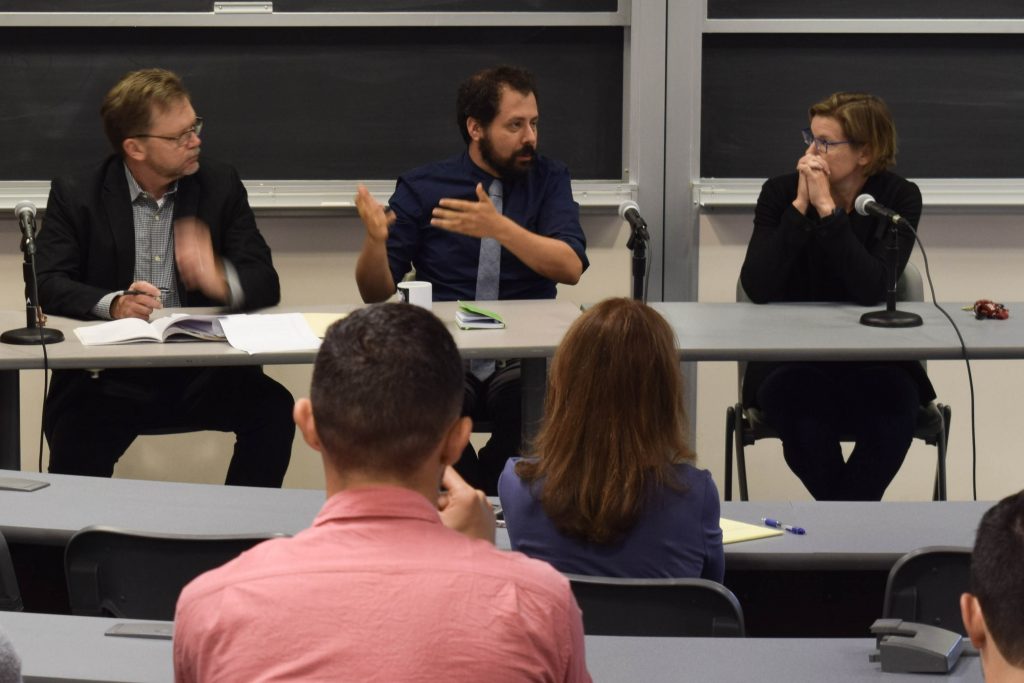When the American Constitution Society hosted a long-scheduled panel on September 19 about Brett Kavanaugh’s nomination to the US Supreme Court—only days after Palo Alto University Professor Christine Blasey Ford’s accusation of sexual assault against him became public—BC Law professors (left to right) Kent Greenfield Dan Farbman, and Kari Hong had to adapt their presentation to accommodate a new reality within the calculus of Kavanaugh’s suitability to serve and the political nature of nominations.
“Let me put this in context,” began Greenfield, a constitutional law and corporate governance scholar, who called the process a “circus.”
“Fifteen of the last 19 Supreme Court appointments were made by a Republican president. The Court is historically extremely politically conservative [and] much further to the right than the national discourse… This is why [mainstream Republicans] look the other way when the president admits to sexual assault, protects racists and misogynists, and creates xenophobic, Islamophobic, racist legislation. They want the Supreme Court,” he said.
For his part, Farbman, who teaches government law, argued that the whole Supreme Court nomination process is what he called a “political project” and should be viewed for what it is. “We should understand these fights as political fights; depoliticizing them is unilateral disarmament.”
Hong, who directs BC Law’s Ninth Circuit Appellate Project, made the case that the country might not find itself in this situation if judges were more geographically, educationally, and socially diverse. “What I see as a practitioner is the question of who is making [judicial] decisions,” she said. “I think a lot is lost when your only perspective is informed by your experience in DC.” She urged students in the audience to consider a judicial career: “I’d like to see everyone here become judges. Your unique experience is needed on the bench.”
The panelists then welcomed questions from the audience. One theme that emerged was how Ford’s sexual assault allegation would affect the timeline of Kavanaugh’s confirmation hearings. Farbman emphasized the multiplicity of political factors involved: “If [the Senate gets] it done before the midterm elections, then it looks as if they’re steamrolling Dr. Ford,” he said.
One student asked whether a Kavanaugh confirmation would put Roe v. Wade, the 1973 Supreme Court Case that decriminalized abortions, in jeopardy. “I think the likelihood of it dying by a thousand cuts is much more likely than it being explicitly overturned,” answered Greenfield, observing that legislation in red states has already increased the burden on those seeking abortions.
When asked what the panelists would like to see in a Supreme Court Justice, all three professors discussed the importance of life experience beyond the courtroom. Professor Hong envisioned a judge who is intellectual, loves the law, and whose empathy has been shaped by life experience. Farbman emphasized moving beyond the idea of competence: “Kavanaugh works hard; his opinions are learned; his clerks know how to Bluebook. But what makes somebody competent isn’t just something that the [American Bar Association] decided up or down.” Greenfield advocated for diversity, explaining that homogeneity in groups promotes groupthink and failure in decision-making.
Ultimately, the panel discussion heightened awareness of how Kavanaugh’s nomination and the ensuing controversy reflect the political polarization of our time.
“I think Kavanaugh will always have an asterisk next to his appointment to the Court if he does make it, [because] Trump is under active criminal investigation,” said Greenfield.
As the event drew to a close, Farbman urged the audience to be aware of the shifting current of cultural and political norms in America. “We’re not going to be able to return to a post-World War II consensus about the world,” he said. “[That’s] a historical anomaly. We might say that we prefer a world where the norms are stable, but I’m not sure that just by preferring that, we can make it so.”
The event was cosponsored by the Asian Pacific-American Law Students Association, BC Law Democrats, Black Law Students Association, Owen M. Kupferschmidt Holocaust/Human Rights Project, Immigration Law Group, and Latin American Law Students Association.


